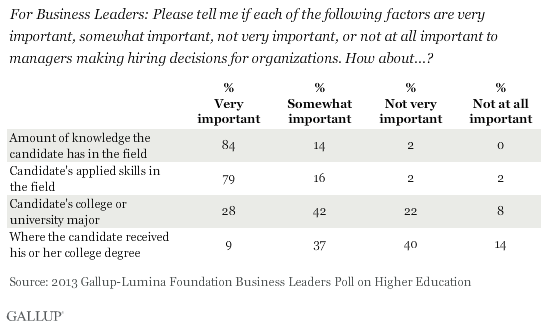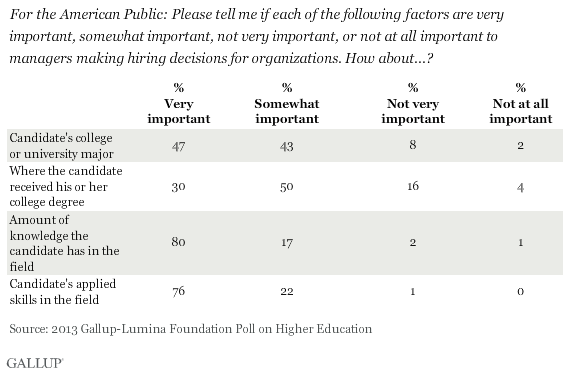最近的SCA5提案鬧得沸沸揚揚,也讓我們對子女大學教育問題有了更迫切的關注。以下幾篇有趣的文章,從最近的蓋洛普調查結果,和 Google 不看重學業成績的聘請政策開始,探討社會上普遍認同的唸名校就能找到好工作的迷思,已經逐漸瓦解。但是名校的吸引力,真的就會因此而消減嗎?你怎麼看?

Business Leaders Say Knowledge Trumps College Pedigree
American public puts more emphasis on college major and institution
WASHINGTON, D.C. -- When hiring, U.S. business leaders say the amount of knowledge the candidate has in a field, as well as applied skills, are more important factors than where a candidate attended school or what their college major was.

Business leaders were asked to rank the level of importance four distinct factors have on hiring. Eighty-four percent of business leaders said the amount of knowledge a candidate has in a particular field was "very important," followed by 79% who said applied skills were very important. These two reasons far outweighed the importance of a candidate's college major (28%) or where the candidate received his or her college degree (9%).
These findings are from a Nov. 25-Dec. 16, 2013, telephone survey with 623 U.S. business leaders conducted by Gallup on behalf of Lumina Foundation. The sample for the business leader study is nationally representative of businesses in the United States, with minimum quotas by sales revenue. The study gauges business leaders' perceptions of higher education in this country. The business leader poll was conducted concurrently with the third annual Gallup-Lumina Poll report on Higher Education.
American Public Perceives Importance of University and Major Differently
Reflecting on the same four factors, the American adult population broadly agrees with the opinions of business leaders in terms of the importance of knowledge and applied skills in the field. About eight in 10 U.S. adults say that knowledge and applied skills in the field are very important to managers making hiring decisions for organizations. The average American, however, rates the candidate's college major and where the candidate received his or her degree as higher in importance than business leaders do. Nearly half of U.S. adults (47%) say the candidate's college or university major is a very important factor to hiring managers, and 30% say where the candidate received his or her college degree is very important.

Implications
Business leaders say that the managers responsible for making hiring decisions are far less concerned with where job candidates earn their degrees, or even the type of degree itself, than they are with what knowledge and skills a candidate brings to the table. This corresponds with recent insights into how large, high-tech corporations like Google conduct their hiring. At Google, hiring managers say certain types of skills and talents are what matter most, more than a particular type of college degree or even having a college degree at all.
As opportunities to access postsecondary degrees, certificates, and credentials continue to evolve and become more accessible through innovative learning models, Americans will be able to expand and use their knowledge in the workplace more quickly and efficiently in the future. Further, there may be more emphasis on what potential employees know and their style of working, rather than on the candidate's degree per se. Thus, while college is still important to business leaders, Americans -- who tend to rate the importance of where and what type of degree was attained higher than do business leaders -- need to recognize that college alone is not enough. Getting a job and achieving long-term success in one's career may increasingly depend on demonstrating real value to employers through experience and targeted learning -- and increasingly less on degrees, even if they are from prestigious universities. Higher education institutions have a tremendous opportunity to partner with businesses to bring relevant, responsive, and timely learning opportunities to workplaces in this country and worldwide.
Survey Methods
This article includes results from two surveys conducted by Gallup on behalf of Lumina Foundation.
The first study reported includes findings from the Gallup-Lumina Foundation Poll on Higher Education, a quantitative survey conducted to understand the perceptions of the general American population about several important issues pertaining to higher education, including degree attainment, quality and value, costs, and innovative learning models. To achieve these objectives, Gallup conducted 1,012 interviews from a random sample of individuals 18 years and older residing in landline telephone only-households, cellphone-only households, and dual-user households.
Gallup conducted surveys in English only from Nov. 25-Dec. 15, 2013. Up to three calls were made to each household to reach an eligible respondent.
The data set was statistically adjusted (weighted) using the following variables: race/ethnicity, gender, education, and age as defined by the most recent data from the Current Population Survey conducted by the U.S. Census Bureau. The final overall results are representative of the U.S. adult population 18 years and older.
The questionnaire was developed in consultation with representatives from Lumina Foundation and Gallup. All interviewing was supervised and conducted by Gallup's interviewing staff. For results based on the total sample size of 1,012 adults, one can say with 95% confidence that the margin of error attributable to sampling and other random effects is ±4 percentage points. For subgroups within this population (e.g., education level, gender, and income), the margin of error would be greater.
The second study reported includes findings from the Gallup-Lumina Business Leaders Poll on Higher Education, a quantitative survey conducted to understand the perceptions of business leaders about the quality and effectiveness of American higher education institutions in preparing graduates for the workforce. Gallup conducted 623 interviews with business leaders in executive and senior roles at their company. The sample was from Dun and Bradstreet. A simple stratified random sample design was used for sampling businesses. Businesses were grouped into five strata based on sales revenue ($50,000-$499,999/$500,000-$4.9Million/$5M-$14.9M/$15M-$49.9M/$50M-$100M+). Businesses with larger sales revenue were oversampled to ensure enough completes for analysis. Weights were calculated to take into account sampling rate and also the non-response rate by sales revenue and census region.
Gallup conducted surveys in English only from Nov. 25-Dec. 16, 2013. Up to five calls were made to each business to reach an eligible respondent.
The questionnaire was developed in consultation with representatives from Lumina Foundation and Gallup. All interviewing was supervised and conducted by Gallup's full-time interviewing staff. For results based on the total sample size of 623 business leaders, one can say with 95% confidence that the margin of error attributable to sampling and other random effects is ±6 percentage points.
In addition to sampling error, question wording and practical difficulties in conducting surveys can introduce error or bias into the findings of opinion polls. Reported frequencies may not add up to 100% in some cases due to rounding or the exclusion of "don't know" and refused results.
Smaller and larger business groups were created for the Lumina Foundation leader project based on annual revenue. For this study, businesses with less than 5 million dollars in annual revenue are classified as small businesses and businesses with more than 5 million dollars in annual revenue are classified as large businesses.


How to Get a Job at Google